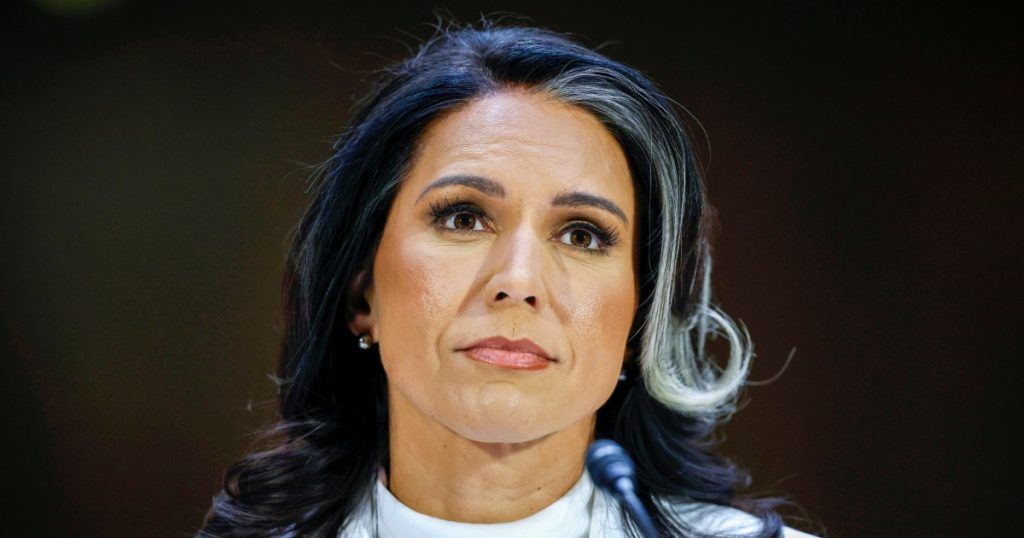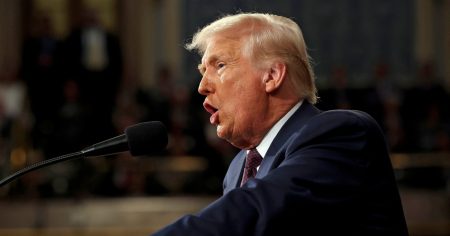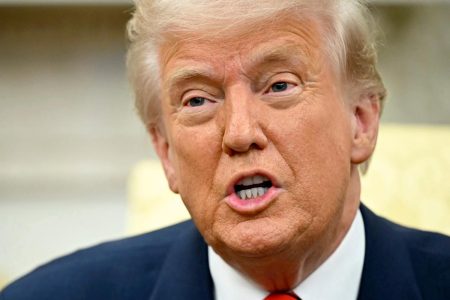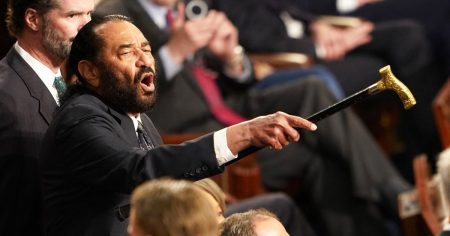The GOP-controlled Senate took a significant step on Monday by advancing the nomination of Tulsi Gabbard to serve as President Donald Trump’s Director of National Intelligence (DNI). The vote, which fell along party lines with 52 Republicans in favor and 46 Democrats opposed, sets the stage for Gabbard’s potential confirmation later this week. Notably, Sens. Thom Tillis (R-N.C.) and John Fetterman (D-Pa.) did not participate in the vote. This decision comes after Gabbard’s nomination narrowly cleared the Senate Intelligence Committee last week with a 9-8 party-line vote. Senate Majority Leader John Thune (R-S.D.) emphasized Gabbard’s commitment to refocusing the intelligence community on its core mission of gathering intelligence and providing unbiased analysis, praising her knowledge and leadership abilities as key qualifications for the role. A final vote on her confirmation is expected by midnight on Tuesday, barring any agreement among senators to expedite the process. Immediately following Gabbard’s vote, the Senate is slated to hold a procedural vote on Robert F. Kennedy Jr.’s nomination as Health and Human Services Secretary.
Despite the momentum behind Gabbard’s nomination, her candidacy has sparked significant controversy. Critics, including Democrats and some Republicans, have raised concerns about her past actions and policy positions. One major point of contention is her 2017 secret meeting with Syrian President Bashar Assad, a figure widely condemned for human rights abuses. Additionally, Gabbard’s history of advocating for the repeal of Section 702 of the Foreign Intelligence Surveillance Act (FISA), a powerful surveillance tool, has drawn scrutiny. Her past support for Edward Snowden, the former government contractor who leaked classified information about U.S. spying programs, has also been criticized. While Gabbard previously argued that Snowden should be pardoned, she reversed her stance during her January 30 confirmation hearing, stating that she would not push for a pardon or clemency for him. However, she stopped short of labeling Snowden a “traitor,” a decision that likely did little to alleviate concerns among her critics.
Gabbard’s evolving positions on key issues have further fueled debate over her nomination. During her confirmation hearing, she appeared to soften her earlier criticism of Section 702, referring to it as a “crucial” tool following congressional reforms last year. Nevertheless, some lawmakers remain unconvinced by her shift in stance. Sen. Mark Warner (D-Va.), the vice chairman of the Intelligence Committee, expressed his opposition to Gabbard’s nomination, citing concerns about her judgment rather than her patriotism. “Nothing less than our national security is currently on the line,” Warner warned, emphasizing the high stakes of the DNI role. As the nation’s top intelligence official, the DNI oversees the 18 agencies comprising the U.S. intelligence community, including the CIA and NSA, making the selection of the right candidate paramount for national security.
Gabbard’s background is both unique and complex, spanning military service, politics, and a high-profile shift in party affiliation. A veteran of the Iraq War and a member of the Army Reserve for over two decades, the 43-year-old has built a reputation for her unconventional approach to politics. Originally a Democrat, she served in the Hawaii State House, on the Honolulu City Council, and later as a U.S. Representative for Hawaii from 2013 to 2021. Her political career took a dramatic turn in 2020 when she ran for the Democratic presidential nomination, ultimately endorsing President Joe Biden over Donald Trump. However, her relationship with the Biden administration soured, leading her to leave the Democratic Party in 2022. In a surprising move last October, just before the 2024 election, Gabbard announced her affiliation with the Republican Party, endorsed Trump for president, and joined him on the campaign trail.
The advancement of Gabbard’s nomination highlights the deeply partisan nature of the confirmation process under GOP control of the Senate. Republicans have largely rallied behind her candidacy, framing her as a capable leader committed to restoring the intelligence community’s focus on its core mission. However, Democrats and some independents remain skeptical, pointing to her past actions and policy positions as evidence of potential weaknesses in her judgment. The final vote on her nomination, expected by Tuesday, will mark a pivotal moment in the debate over the future of U.S. intelligence leadership. Should she be confirmed, Gabbard would assume a critical role in shaping the intelligence community’s priorities and operations at a time of significant global challenges.
The broader implications of Gabbard’s nomination extend beyond her personal qualifications to reflect the ongoing tensions within the Republican Party and the evolving dynamics of U.S. politics. Her shift from Democrat to Republican, coupled with her endorsement of Trump, underscores the fluid nature of political allegiances in contemporary America. At the same time, her nomination has reignited debates about national security, surveillance, and the role of intelligence agencies in a democratic society. As the Senate prepares for its final vote, the nation waits to see whether Tulsi Gabbard will become the next Director of National Intelligence, a decision that could shape the trajectory of U.S. intelligence operations for years to come.









